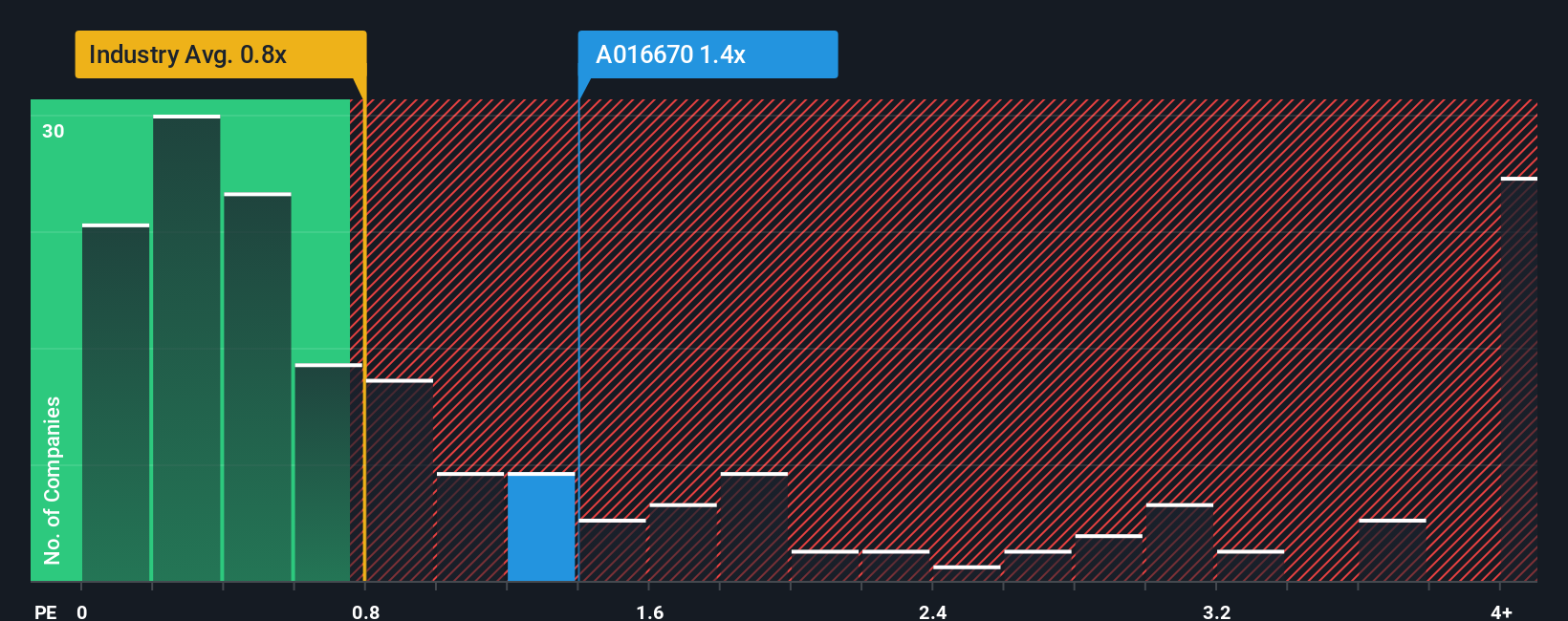- South Korea
- /
- Electronic Equipment and Components
- /
- KOSDAQ:A016670
What DMOA Co., Ltd's (KOSDAQ:016670) 52% Share Price Gain Is Not Telling You
DMOA Co., Ltd (KOSDAQ:016670) shareholders have had their patience rewarded with a 52% share price jump in the last month. Unfortunately, despite the strong performance over the last month, the full year gain of 8.3% isn't as attractive.
After such a large jump in price, when almost half of the companies in Korea's Electronic industry have price-to-sales ratios (or "P/S") below 0.8x, you may consider DMOA as a stock probably not worth researching with its 1.4x P/S ratio. Nonetheless, we'd need to dig a little deeper to determine if there is a rational basis for the elevated P/S.
Check out our latest analysis for DMOA

What Does DMOA's P/S Mean For Shareholders?
As an illustration, revenue has deteriorated at DMOA over the last year, which is not ideal at all. Perhaps the market believes the company can do enough to outperform the rest of the industry in the near future, which is keeping the P/S ratio high. If not, then existing shareholders may be quite nervous about the viability of the share price.
Although there are no analyst estimates available for DMOA, take a look at this free data-rich visualisation to see how the company stacks up on earnings, revenue and cash flow.How Is DMOA's Revenue Growth Trending?
The only time you'd be truly comfortable seeing a P/S as high as DMOA's is when the company's growth is on track to outshine the industry.
In reviewing the last year of financials, we were disheartened to see the company's revenues fell to the tune of 4.6%. The last three years don't look nice either as the company has shrunk revenue by 15% in aggregate. Accordingly, shareholders would have felt downbeat about the medium-term rates of revenue growth.
Comparing that to the industry, which is predicted to deliver 16% growth in the next 12 months, the company's downward momentum based on recent medium-term revenue results is a sobering picture.
With this in mind, we find it worrying that DMOA's P/S exceeds that of its industry peers. It seems most investors are ignoring the recent poor growth rate and are hoping for a turnaround in the company's business prospects. Only the boldest would assume these prices are sustainable as a continuation of recent revenue trends is likely to weigh heavily on the share price eventually.
The Bottom Line On DMOA's P/S
DMOA's P/S is on the rise since its shares have risen strongly. It's argued the price-to-sales ratio is an inferior measure of value within certain industries, but it can be a powerful business sentiment indicator.
Our examination of DMOA revealed its shrinking revenue over the medium-term isn't resulting in a P/S as low as we expected, given the industry is set to grow. When we see revenue heading backwards and underperforming the industry forecasts, we feel the possibility of the share price declining is very real, bringing the P/S back into the realm of reasonability. Unless the recent medium-term conditions improve markedly, investors will have a hard time accepting the share price as fair value.
Plus, you should also learn about these 4 warning signs we've spotted with DMOA (including 2 which are a bit concerning).
If you're unsure about the strength of DMOA's business, why not explore our interactive list of stocks with solid business fundamentals for some other companies you may have missed.
New: Manage All Your Stock Portfolios in One Place
We've created the ultimate portfolio companion for stock investors, and it's free.
• Connect an unlimited number of Portfolios and see your total in one currency
• Be alerted to new Warning Signs or Risks via email or mobile
• Track the Fair Value of your stocks
Have feedback on this article? Concerned about the content? Get in touch with us directly. Alternatively, email editorial-team (at) simplywallst.com.
This article by Simply Wall St is general in nature. We provide commentary based on historical data and analyst forecasts only using an unbiased methodology and our articles are not intended to be financial advice. It does not constitute a recommendation to buy or sell any stock, and does not take account of your objectives, or your financial situation. We aim to bring you long-term focused analysis driven by fundamental data. Note that our analysis may not factor in the latest price-sensitive company announcements or qualitative material. Simply Wall St has no position in any stocks mentioned.
About KOSDAQ:A016670
DMOA
Engages in the distribution of software and hardware products in South Korea.
Excellent balance sheet and good value.
Market Insights
Community Narratives


Recently Updated Narratives


MINISO's fair value is projected at 26.69 with an anticipated PE ratio shift of 20x


The Quiet Giant That Became AI’s Power Grid


Nova Ljubljanska Banka d.d will expect a 11.2% revenue boost driving future growth
Popular Narratives


The company that turned a verb into a global necessity and basically runs the modern internet, digital ads, smartphones, maps, and AI.


MicroVision will explode future revenue by 380.37% with a vision towards success



